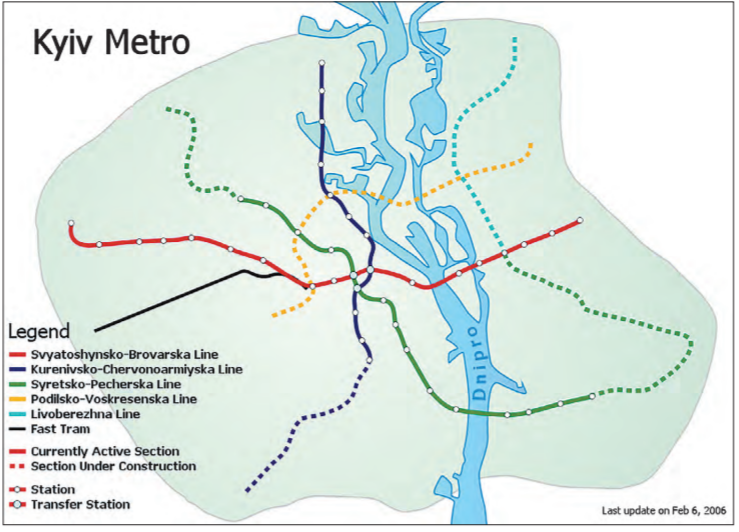Over the next five years, the Kyiv metro system is planning to spend $3 billion on major expansion plans
Over the next five years, the Kyiv metro system is planning to spend $3 billion on major expansion plans, including the addition of 20 new stations, at least one new line, and several other features.
Although metro expansion plans have been repeatedly delayed and in the works for several years, Kyiv Metropolitan, the company that runs the city’s subway system, announced plans to speed up work over the next five years at a press conference Aug. 9.
Petro Miroshnikov, director of the Kyiv Metropolitan, said that the company will need to build four to five metro stations per year to reach its goal.
While many of the projects are due to be completed by 2012, in time for the European Soccer Championships, portions of the expansion plans aren’t expected to be finished until after 2020.
Miroshnikov said that in addition to hiring Kyivmetrobud, a Kyiv-based metro construction company that has been building Kyiv’s metro since the first line was constructed in 1960, Kyiv Metropolitan will also be enlisting foreign companies for construction projects. Kyivmetrobud only has the capacity to build one metro station a year, Miroshnikov added.
The construction of Kyiv’s metro started in 1960, and it was the third metro system built in the former Soviet Union. Currently, Kyiv’s metro includes three lines, with a total of 45 stations. Approximately 1.6 million riders use the metro daily, which is just over 50 percent of the city’s official population of 3 million. While the metro system is owned by the Kyiv City Council, it is operated by Kyiv Metropolitan.
Altogether, the proposed plans would increase the number of metro stations from 45 to nearly double that number by the 2030s, lengthening all three of the preexisting lines and adding two new lines.

Kyiv Metropolitan is working particularly hard to put the fourth line, the Podilsko-Vygurivska line, into operation over the next five years. This project is unquestionably the most ambitious and costly of the projects, consisting of 12 new stations and necessitating the construction of a bridge that runs across Turkhaniv Island and the Dnipro River. The estimated cost of the construction project is $1.06-1.12 billion.
This line will connect the vicinity near Kyiv’s main international railway station, Vokzalna, with the neighborhood of Troyeshchina on the city’s right bank.
In addition to construction of the new line, plans also call for extending the Kurenivsko-Chervonoarmiyska line by four stations to the national exhibition center in Kyiv’s southwestern districts of Holosiyiv-Teremky, to finish construction of the Lvivska Brama station, and build a second exit for the Vokzalna station. These projects will cost $420 million, $49 million and $68 million, respectively.
The line will include transfer stations at Vokzalna, Dorohozhychi, Tarasa Shevchenka, and another with a station on the Livoberezhna line that has yet to be built.
Kyiv Metropolitan is also working on the addition of a fifth line, the Livoberezhna line, to be finished sometime after 2020. This line will run down the right bank.
To accommodate these new expansions, Kyiv Metropolitan plans to launch over 600 new metro wagons by 2012, costing another $1.2-1.3 billion.
The metro expansions plans are part of a number of measures that are being taken to update the city’s infrastructure and transport system in time for the European games, which are expected to bring thousands of tourists to Kyiv.
According to Miroshnikov, the funds for the projects can be gathered from the city and state budgets. He added that the state budget has already provided over $221 million for projects that are being undertaken this year.
In addition, on Aug. 17, Kyiv Metropolitan received a 40-million-euro loan from the European Bank for Reconstruction and Development, which will finance up to 15 new metro trains for the Syretsko-Pecherska line.
However, whether or not Kyiv Metropolitan can realistically count on city and state budgets to provide such a sum remains to be seen.
Anatoly Golubchenko, first deputy head of the Kyiv city administration, told journalists July 30 that the city would need nearly $7.6 billion to put Kyiv’s transportation infrastructure in order for the 2012 games.
His estimates include the cost of metro development, surface transportation, the construction of road junctions and bridges, acquisition of new trains, as well as improving road safety.
Golubchenko said that of that sum, $1-1.2 billion can be allotted from Kyiv’s city budget, while a similar sum can be drawn from investment, creating a combined total of around $2-3 billion – or just barely reaching the amount needed to finish the proposed metro expansion plans.
“The question of where the remaining 20 billion hryvnias [$4 billion] will be drawn remains unclear,” the first vice mayor added.
The projects could also be hampered by legal battles, as they have been in the past.
Just last July, courts blocked several of the aforementioned projects due to procedural violations, as well as claims that Kyivmetrobud was given the right to construction projects without holding a lawful tender and allowing competition.
